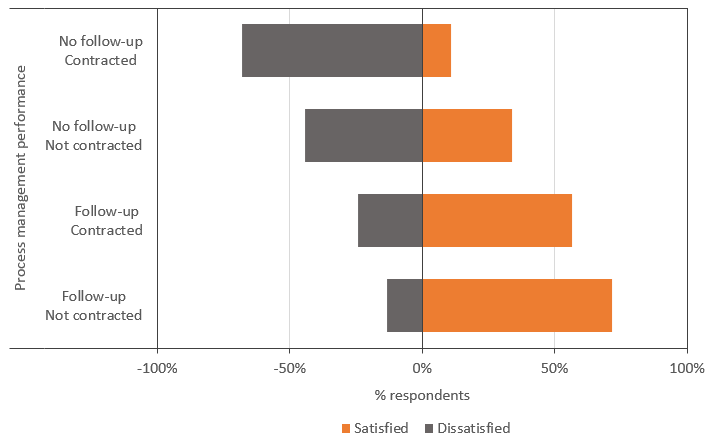‘Feedback is good for an architect’s business’ paraphrases a headline in the Royal Institute of British Architects’ Journal.
The architectural profession depends heavily on repeat clients and recommendations; in some firms >90% of annual income is from these two sources. Yet independent research shows that other than sometimes perfunctory post-occupancy surveys, architects collect little or no systematic feedback from their clients.
Let alone, do architects use client feedback data to improve the value they deliver to their clients or lift the effectiveness of their own client retention and business development performance?



Source: Royal Institute of British Architects Journal
According to findings reported in the Royal Institute of British Architects Journal, clients rate architects who do not follow up on completion of a project worse than they rate those who do. In the graph, ‘contracted’ means the architect won the project and conversely, ‘not contracted’ was not successful. Whether the architect won the job or not, the chart shows clients and prospects who were asked for feedback felt more satisfied with the process than those who were not.
In plain English, beaton interprets this as: not asking for feedback leaves a bad taste for clients and prospects alike.
The chart above from the RIBAJ report refers to satisfaction with an architect’s performance on process management. Other data in the report shows the same pattern for design performance.
The Journal continues, I assume being deliberately provocative, “Dabbling in client feedback is not easy for architects. Apart from being a bit wishy washy, it diverts resources from earning fees. It doesn’t fit well with their training, which casts them as superhero guardians of the public good. In this rose-tinted world view, customer service is implicit in every flex of their professional muscle, so why would they do more?”
RIBA’s survey showed, “a fair proportion of architects simply walked away at the end of their contract, with ne’er so much as a backward glance. They paid a penalty, apparently: their overall satisfaction ratings were on average significantly worse than those for architects who stayed around.”
A contrary and dare we say it, progressive way to view this, also from the RIBAJ:
If client feedback is positive, it makes good marketing material; and if it’s not, then the firm can at least learn from it.
This begs the question why so few architects collect client feedback systematically. Based on our own interactions with Australian and New Zealand architects in the past couple of years, beaton believes the reason is architects, particularly in medium-small practices, don’t have the resources to do so.
Firms who did not ask client feedback after completing a project had lower client satisfaction, especially when they were contracted to do so.
The corresponding post type is disabled. Please make sure to 1) install The7 Elements plugin under The7 > Plugins and 2) enable desired post types under The7 > My The7, in the Settings section.




